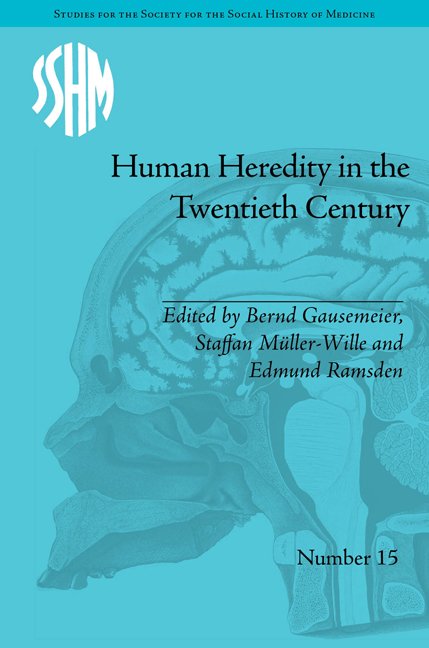Book contents
- Frontmatter
- Contents
- Acknowledgements
- List of Contributors
- List of Figures and Tables
- Introduction: Human Heredity in the Twentieth Century
- Part I Constructing Surveys of Heredity
- Part II Blood and Populations
- 4 From ‘Races’ to ‘Isolates’ and ‘Endogamous Communities’: Human Genetics and the Notion of Human Diversity in the 1950s
- 5 Between the Transfusion Services and Blood Group Research: Human Genetics in Britain during World War II
- 6 The Abandonment of Race: Researching Human Diversity in Switzerland, 1944–56
- 7 Post-War and Post-Revolution: Medical Genetics and Social Anthropology in Mexico, 1945–70
- Part III Human Heredity in the Laboratory
- Part IV Understanding and Managing Disease
- Part V Reconstructing Discipline(s)
- Notes
- Index
7 - Post-War and Post-Revolution: Medical Genetics and Social Anthropology in Mexico, 1945–70
from Part II - Blood and Populations
- Frontmatter
- Contents
- Acknowledgements
- List of Contributors
- List of Figures and Tables
- Introduction: Human Heredity in the Twentieth Century
- Part I Constructing Surveys of Heredity
- Part II Blood and Populations
- 4 From ‘Races’ to ‘Isolates’ and ‘Endogamous Communities’: Human Genetics and the Notion of Human Diversity in the 1950s
- 5 Between the Transfusion Services and Blood Group Research: Human Genetics in Britain during World War II
- 6 The Abandonment of Race: Researching Human Diversity in Switzerland, 1944–56
- 7 Post-War and Post-Revolution: Medical Genetics and Social Anthropology in Mexico, 1945–70
- Part III Human Heredity in the Laboratory
- Part IV Understanding and Managing Disease
- Part V Reconstructing Discipline(s)
- Notes
- Index
Summary
Introduction
The history of science focused outside of Europe and the United States has contributed to our understanding of the construction of knowledge in two ways – through the theories of diffusion and dependency. The first centres on the spread of metropolitan knowledge through nations on the periphery. The second is centred on the asymmetrical relationship between centre and periphery, characterized by the latter's inability to build an autonomous system of scientific and technological innovation, and the importation of foreign knowledge by local elites. Despite their obvious differences, both types of theories have produced national accounts of science and technology in peripheral countries which are restricted to local events, and which ignore the international context. In neither case is there an emphasis on global or reciprocal connections, or a focus on circuits of practices that may help explain the construction of knowledge at both the regional and global level.
The rise of postcolonial studies in the history of science has emphasized the need for interconnected histories. As Sanjay Subrahmanyam has suggested, we need ‘connected histories as opposed to comparative histories’. These would need to be written from a symmetrical point of view. While interconnected histories require a focus on the circulation of people, technologies and materials, symmetrical accounts demand the acknowledgement of local resistances and the recognition that the practices of more marginal partners help shape the knowledge and practices at the hegemonic centres.
- Type
- Chapter
- Information
- Human Heredity in the Twentieth Century , pp. 101 - 112Publisher: Pickering & ChattoFirst published in: 2014



